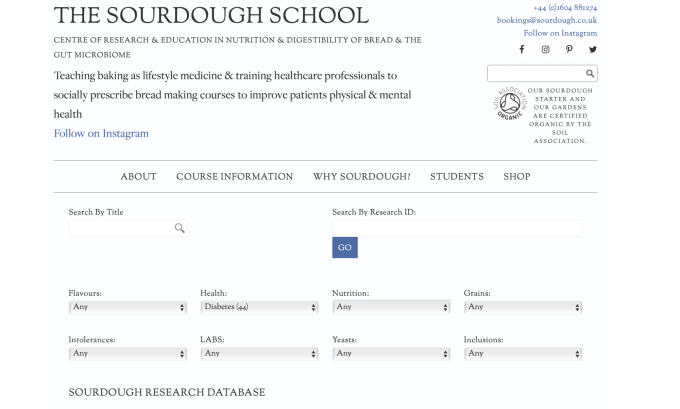These studies are the ones I mention in the lives. To facilitate discussion, and understanding I try to choose the studies I feel are most relevant to the topic, or the ingredients in the recipe.
 Your research task are about engaging you in the research.
Your research task are about engaging you in the research.
- For access to our Research Library please log in to the www.sourdough.co.uk website but please use our spare user log in: [email protected] with password: Sourdough1983*** Once logged in your can then access the Research Library click here
- Each study has a reference number – this number allows you to cross reference to Vanessa’s Doctorate.
- To access the papers from Vanessa’t doctorate in Baking as Lifestyle Medicine (BALM) please follow this link. The password if required is Sourdough1983 (Please be mindful that this is a private permission from Vanessa to access her research folders)
- Useful for the Journal Club – if you are have asked to present a subject in the Journal Club you will also find this database useful and referring to the number as a reference will allow listeners to find the papers.
Note
These studies in this library are all selected for interest and discussion, and not necessarily for how robust they are. Why? Baking as Lifestyle Medicine is so complex, and yet also so simple that almost everything that you do around the baking, eating and sharing bread is related.
They have been added over 5 years, and you will find that some of them have been superseded by new research, which is why we encourage you to do some of your own research as part of your engagement.
A guide on how to approach the research papers
If you are new to looking at studies then it can be intimidating to read them for the first time so I have added some common phrases below to help understand them. For some people it’s easy and others it is like trying to read another language so we developed a study summary that enables discussion for anyone who is learning, whatever your level, and they key is in understanding how this evidence can be used in a practical way .
How to find your own research
How to think about these studies
Ask yourself how these studies are relevant to the topic and the impact on physical and mental health and consider how the studies below relate the the bread protocol in the way that we bake, or choose the ingredients for the bread, or the symbiotic eating and routines, and then ask yourself how can eat this or how can I use this in the way we approach baking as lifestyle medicine
Understanding Different Kinds of studies
Qualitative/quantitative
Distinguishes based on data type generated. Qualitative or exploratory research explores the health-related phenomena with the aim of providing insights into the problem. Quantitative research on the other hand generates measurable data that can be analysed and turned into useable statistics. Both Interventional and observational studies fall into the qualitative category.
Observational/interventional
Distinguishes between studies where participants are actively assigned to specific interventions as opposed to those where they are not.
Clinical/animal/in vitro
Distinguishes according to the study subject. Think of it as People/animal/test tube
Prospective/retrospective/cross-sectional
These kin=d of studies are according to the time period that the study views. So prospective studies look forward, retrospective studies look into the past, cross-sectional studies are of a moment or very short time span only.
Randomised/not randomized
This phrase means that the study is based on the way the study subjects are allocated to the different groups. Radomized studies utilize allocation protocols to eliminate selection bias, and makes the evidence more robust.
Controlled/not controlled
This looks at the difference in the participants in a studies that have control groups and studies that do not have them. So you can see the differences, for example a group of people who do nothing at all could be a control group against say a group of people who get to do something. You can then compare the differences.
Blinded/not blinded
This is about distinguishes studies based on the blinding of experimentator and/or subject. So sometimes the participants have no idea what they are eating or doing and sometimes even the person who is doing the study doesn’t know. This helps eliminate bias
Narrative/systematic/meta-analysis
This only applies for reviews. The distinction is based on the way that the data selection is presented and this impacts the subsequent analysis.

